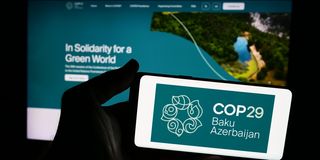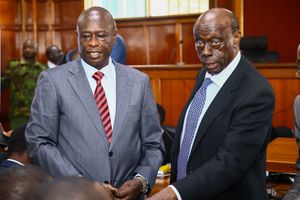Happening Now: Court: Ruto's Housing Levy is constitutional
Road to COP29: Africa needs Sh167 trillion annually to address the climate crisis

The world is gearing up for COP29, the largest climate conference scheduled to take place in Baku, Azerbaijan, in November.
What you need to know:
- The 100 billion US dollar figure, which was not based on an analysis of actual needs, was formalised at COP16 in Cancun.
- The Green Climate Fund (GCF) was established as a key delivery mechanism for this financing.
As the world gears up for COP29, the largest climate conference scheduled to take place in Baku, Azerbaijan, this November, Africa finds itself once again grappling with the financial shortfall needed to combat the climate crisis.
While international headlines are buzzing with announcements of new emissions targets and significant financial commitments, the reality for Africa is far from optimistic.
According to the New Quantified Collective Goal on Climate Finance (NCQG), the continent requires 1.3 trillion US dollars annually to address its climate challenges—yet current financial flows for adaptation and mitigation fall drastically short.
This shortfall was a key focus during the 10th special session of the African Ministerial Conference on the Environment (AMCEN), held last week in Abidjan, Côte d'Ivoire. African ministers adopted a unified position ahead of COP29, stressing the need for ambitious climate finance outcomes.
“As we head to COP29, the Africa group is prioritising the need for ambitious climate finance outcomes. We are particularly focusing on an ambitious NCQG outcome based on evolving needs, as reflected in developing countries' Nationally Determined Contributors (NDCs), National Adaptation Plans, and other national climate planning and programming instruments. Our position includes a quantum of 1.3 trillion US dollars per annum by 2030; quality of finance that is informed by criteria including debt sustainability, cost of borrowing, and significantly from public sources, thus emphasising grant and highly concessional finance; and transparent mechanisms in respect of accountability," said Ali Mohamed, Chair of the African Group of Negotiators on Climate Change (AGN), as he outlined Africa’s priorities.
The NCQG is the post-2025 climate finance goal, succeeding the 100 billion US dollars annual commitment made by developed nations at the 2009 Copenhagen Conference of the Parties (COP15). This pledge, which aimed to mobilise 100 billion US dollars annually by 2020 for climate action in developing countries, has yet to be fully realized.
At COP15, former UK Prime Minister Gordon Brown introduced the 100 billion US dollar target as part of a "new international partnership on public finance for climate change," focusing on equity, shared governance, and predictability.
Former US Secretary of State Hillary Clinton later announced that the funds would be directed towards the "poorest and most vulnerable" nations, with a focus on adaptation and forestry.
However, the 100 billion US dollar figure, which was not based on an analysis of actual needs, was formalised at COP16 in Cancun. The Green Climate Fund (GCF) was established as a key delivery mechanism for this financing.
The Paris Agreement, adopted at COP21 in 2015, reaffirmed the commitment, stating that the funds should be mobilized annually between 2020 and 2025. To date, the target remains unmet.
At this year’s AMCEN, African ministers expressed frustration over the global north's failure to fulfill its financial commitments, even as Africa faces the brunt of climate change. The ministers highlighted the growing financial gap, with Africa requiring an estimated $2.8 trillion to implement its Nationally Determined Contributions (NDCs).
“As outlined in the 2023 State of Climate Report in Africa, the continent remains on the front lines of the climate crisis. Rising temperatures, erratic rainfall patterns, and extreme weather events are devastating key sectors such as agriculture, water, and health. Droughts and floods have crippled agricultural productivity, causing food insecurity and health crises across the continent,” noted Mr Mohamed.
The AGN chair, who also serves as President William Ruto's climate advisor, emphasized other key priorities for Africa in the lead-up to COP29. These include the operationalisation of the Loss and Damage Fund (L&D) to help African countries recover from irreversible climate impacts, ensuring a just transition tailored to Africa’s development needs, addressing Africa’s special vulnerabilities, and finalizing robust rules for carbon markets that align with the Paris Agreement's goals.
"Kenya is pursuing innovative policies and interventions designed to bolster resilience against the increasingly severe impacts of climate change, particularly droughts. In recent years, Kenya has faced significant challenges due to recurring droughts, which have threatened food security and strained water resources," Aden Duale, Cabinet Secretary, Ministry of Environment, Climate Change and Forestry, Kenya told delegates.
Julius Mbatia, a climate finance expert, believes that Africa’s success at COP29 will depend on the NCQG exceeding 1 trillion US dollars annually and reflecting the true needs of developing nations.
"We know that the financial architecture has not benefited developing countries because it was not designed with their needs in mind. The climate sector should not be approached the same way, as financing for climate is different from financing for development or economic purposes. It requires specific principles, such as being additional to development finance and new, as climate change imposes an additional burden on developing countries with constrained economies," Mr Mbatia said.
Mr Mbatia believes that strong media and communications engagement is crucial to unlocking progress at the global level. "By presenting our narratives in a nuanced way, focusing on the need for change and the shortcomings of developed countries' leadership, we can tip the scales of the technical and political conversation in favour of genuine adherence to principles of the Convention and its Paris Agreement," he said.
"African countries should not passively accept the terms offered in global climate negotiations. Instead, they should demand more favourable financial terms and be prepared to withhold their NDCs or boycott COP 29 if necessary," he added.
"While this approach is risky and could marginalise Africa's voice, it is essential for Africa to negotiate from a position of strength due to its abundant renewable energy resources and essential minerals," he told Climate Action.



